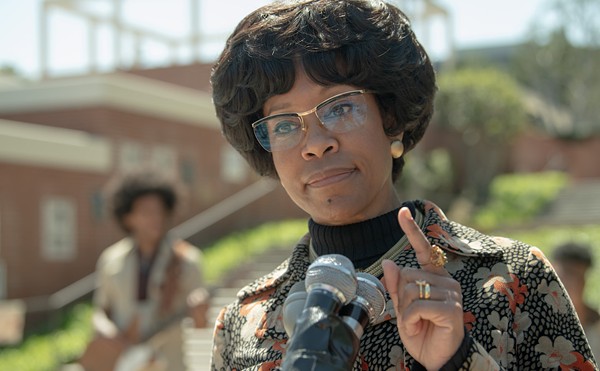Both Kar Wai and Soderbergh succeed in invoking the master while retaining a kind of autership, a stylistic ownership, of their work. Their films are smart and engaging, beautiful to watch, with a refinement of perspective and light rarely seen on the contemporary screen. (A short way of saying this: They're art.) Antonioni, for his part, has done an excellent job of being himself and maybe even of chuckling at himself -- or, at least, it's fun to think so. As a single entity, Eros is a strong work, rich with detail and nuance, though perhaps without the philosophical depth that its French producers intended. But who cares? This is a feast for the eyes. And, at times, for parts farther south.
Eros opens with Kar Wai's segment about a tailor (Chang Chen) besotted with desire for an elegant courtesan, played by Gong Li (Chinese Box). The piece is titled "The Hand," but it's also about the shoulder, the neck, the crotch -- and, in a starring role, the torso. In fact, toward the beginning, an entire scene passes between two torsos, at sexual odds with each other, one pursuing and the other resisting. We don't see the faces; we only hear the voices. But even the words are superfluous; everything that happens, happens in the hips.
"The Hand" is a gorgeous work of slow and painful longing, saturated in gray, soaking in romantic pathos. Year after year, the tailor toils at his machine, crafting dresses for a woman who wears them to woo others. Meanwhile, as the seasons pass, the courtesan falls into disgrace, losing her elegant apartment, her dresses and ultimately her health. In a dank hotel, where the failing Miss Hua and the now-successful (if emotionally bottled) tailor meet for a final time, Hua seeks belated redemption.
Soderbergh's "Equilibrium," about a neurotic man fussing over a sexual dream, is a lighter piece of work. Essentially a jest, its subject is less eros than the worry over eros, and the contrivance toward eros, that make up the average man's experience of desire. Soderbergh liked the idea of casting both Robert Downey Jr. and Alan Arkin -- two men not noted for their erotic allure -- in a film about sex, and Arkin plays, hilariously, a profoundly distracted psychiatrist. Downey is less interesting, and his solipsism feels anachronistic (the film is supposed to take place in 1955), but Arkin sails through, carrying us along. Soderbergh uses black and white for the entire therapy session, and he goes to town with the chiaroscuro; watch for the scene where Downey's head disappears in shadow. Again, torso rules.
There are delights aplenty in Antonioni's "The Dangerous Thread of Things," about a couple whose relationship has tanked. For one, there are naked breasts. At the segment's opening, long-and-lean Cloe (Regina Nemni) sunbathes without a shirt. When her husband Christopher (Christopher Buchholz) takes her for a drive, she slips on a shirt, but it's transparent. Yes, the generous Atonioni says to us, you can look at her breasts for the entire film. Except not quite: There's another character, the young and exceptionally bouncy Linda (Luisa Ranieri), whose breasts we must also devour, at great length. Truly, they're delicious (though possibly fake).
Also ripe for the savoring are several classic Antonioni lines. "I've always loved this place," Cloe sighs, "but here with you, today, it oppresses me." Later, Christopher retorts: "You're always looking for purity and ending up in shit." All of this posturing would be more silly than not if Antonioni weren't up to his usual tricks of stunning visual beauty, languorous shots and loaded detail.
Uniting all three segments, and presumably the result of the tribute to Antonioni, is the art of the unseen. Characters are constantly talking to, or looking at, or overhearing someone beyond the frame, someone we aren't allowed to observe. In fact, all three stories dwell luxuriously in mystery, milking a kind of sensual dreaminess from our not knowing, until they reveal what they were meant to reveal. The result is a three-course delicacy -- not for every taste, but a banquet for those it will please.





